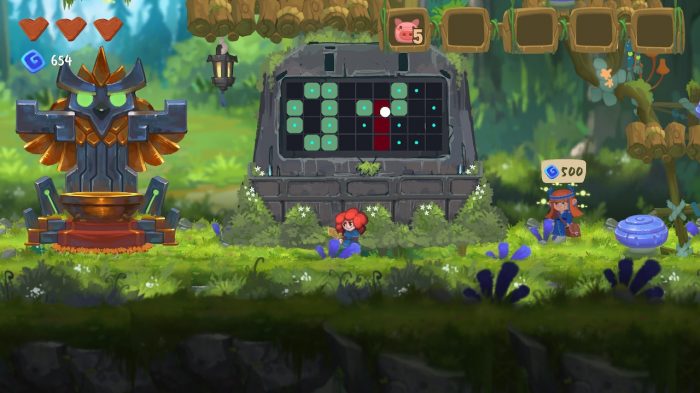Indie platformers are quick to fall to mediocrity following any lack of dedication from the developer to make them stand out. Potata: Fairy Flower may not be the most refined experience available on the Switch, but through a combination of strong efforts in audio-visual and level design from developer Potata Company, this debut adventure does provide a thoroughly enjoyable woodland romp.
Potata: Fairly Flower is a puzzle-platformer with inventory management elements set in a magical world lifted straight from a children’s bedtime story. Audio-visually, Potata is positively bursting with Rayman Legends vibes. It’s rife with colour and animation, and the supporting soundtrack is beautiful, carried with decorative piano and frenzied string instruments that capture the magical energy of the setting perfectly. Fairies, talking animals, and witches and wizards all play a part in this 3-5 hour experience.

After her pet fox gets sick, Potata the witch ventures out into the forest to fetch a special leaf for her Mother to brew a medicine to make it better. Unfortunately, Potata being the the happy-go-lucky scamp she is, enjoys her rambling adventure a little too much, and picks the petals of the forest fairy’s favourite flower. Outraged, the fairy demands that Potata gather the six golden petals that have been scattered throughout the world or she will no longer protect her village. Yes, this children’s tale features straight-up blackmail from a fairy.
The village serves as a hub world that Potata can venture from. Access to different biome areas is restricted, and tasks will need to be completed for townspeople to lower bridges, create teleportation portals, fix lift systems etc to explore further. It needs to be noted that – albeit mostly unintentionally – the dialogue can be comedy gold, and I thoroughly enjoyed reading some really strange exchanges. In each new area, you will need to employ some fairly accurate precision platforming skills to avoid the many thorny traps and dangerous enemies, and to reach the collectable currency hidden throughout, all for which Potata: Fairy Flower demonstrates some excellent level design.

Melee combat does play a part throughout, and features in a couple of lacklustre boss battles, though i found the combat consistently play second fiddle to the core platforming experience at the heart of the game. Item management is also explored, and more successfully. Keys can be found to unlock chests, special berries can be used to put impassable monsters to sleep, planks can be found to create bridges at certain points etc. Everything seemed to have its place, and for the most part the game felt intuitive enough to know what that was.
The other area that Potata focuses on is puzzle-solving, and for me it’s where the game lets itself down. Although incidental puzzles like switches and block moving felt perfectly suitable to the levels’ design, there were consistent breaks in gameplay to solve puzzles on boards in order to progress. Unfortunately for the most part these felt either way too hard or way too easy, and the former could put a real drag on an otherwise fluid experience.

Potata: Fairly Flower is a strong start for a new developer. Although there’s too much going on here, resulting in some underdeveloped ideas, there’s enough wonderful stuff to make up for it. The platforming and level-design is solid, the dialogue is often hilarious, and the presentation is completely charming. It’s worth a go for genre fans, and I look forward to seeing what’s next from this studio.
Potata: Fairy Flower
Summary
Potata: Fairy Flower isn’t going to boil your spuds, but it’s a perfectly enjoyable title. It may have some unfinished edges and lacklustre puzzle content, but the solid platforming experience, accidental comedy, and excellent audio-visual presentation make up for it.

